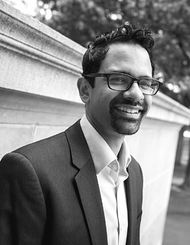
Virtual Event: Victor Seow
presenting
Carbon Technocracy:
Energy Regimes in Modern East Asia
in conversation with SUNIL AMRITH
DateApr
1
Friday
April 1, 2022 12:00 PM ET |
LocationJoin our online event (or pre-register) via the link in the event description.
|
Tickets
Free - $5 contribution suggested at registration
|
Harvard Book Store's virtual event series welcomes VICTOR SEOW—assistant professor of the history of science at Harvard University—for a discussion of his book Carbon Technocracy: Energy Regimes in Modern East Asia. He will be joined in conversation by SUNIL AMRITH—the Renu and Anand Dhawan Professor of History at Yale University.
Contribute to Support Harvard Book Store
While payment is not required, we are suggesting a $5 contribution to support this author series, our staff, and the future of Harvard Book Store—a locally owned, independently run Cambridge institution. In addition, by pre-ordering a copy of Carbon Technocracy on harvard.com, you support indie bookselling and the writing community during this difficult time.
About Carbon Technocracy
The coal-mining town of Fushun in China’s Northeast is home to a monstrous open pit. First excavated in the early twentieth century, this pit grew like a widening maw over the ensuing decades, as various Chinese and Japanese states endeavored to unearth Fushun’s purportedly “inexhaustible” carbon resources. Today, the depleted mine that remains is a wondrous and terrifying monument to fantasies of a fossil-fueled future and the technologies mobilized in attempts to turn those developmentalist dreams into reality.
In Carbon Technocracy, Victor Seow uses the remarkable story of the Fushun colliery to chart how the fossil fuel economy emerged in tandem with the rise of the modern technocratic state. Taking coal as an essential feedstock of national wealth and power, Chinese and Japanese bureaucrats, engineers, and industrialists deployed new technologies like open-pit mining and hydraulic stowage in pursuit of intensive energy extraction. But as much as these mine operators idealized the might of fossil fuel–driven machines, their extractive efforts nevertheless relied heavily on the human labor that those devices were expected to displace. Under the carbon energy regime, countless workers here and elsewhere would be subjected to invasive techniques of labor control, ever-escalating output targets, and the dangers of an increasingly exploited earth.
Although Fushun is no longer the coal capital it once was, the pattern of aggressive fossil-fueled development that led to its ascent endures. As we confront a planetary crisis precipitated by our extravagant consumption of carbon, it holds urgent lessons. This is a groundbreaking exploration of how the mutual production of energy and power came to define industrial modernity and the wider world that carbon made.
Praise for Carbon Technocracy
"A brilliant account of energy and empire, industrial hubris, and ecological destruction told through the story of the coal capital of China. Providing an alternative global history of technology, the book argues for a distinctive understanding of the role of fossil-fuel energy in shaping the political order of East Asia in the age of carbon." —Timothy Mitchell, author of Carbon Democracy
"Impressive in scope and significance, Carbon Technocracy offers compelling evidence of the historical relationship between the fossil fuel economy and the rise of the modern nation-state in China and beyond. Readers will gain a fresh understanding of the roots of fossil fuel addiction and its consequences, which encompass not only ecological destruction but also violent exploitation of laborers and increased state capacity for social control. Through a rich historical excavation centered in one Manchurian coal mine, Seow demonstrates in no uncertain terms why we must look beyond technocratic solutions as we struggle to survive the climate crisis." —Sigrid Schmalzer, author of Red Revolution, Green Revolution
"Seow shows that civilizations built on coal undermine their own foundations with each strike of the shovel. His exploration of carbon technocracy highlights how the desire for technological progress and development runs along a deep seam of violence. Profoundly humane and thoughtful." —Kate Brown, author of Manual for Survival

Harvard Book Store’s award-winning event series continues online! Named "Best of Boston: 2020 Best Virtual Author Series" and "2021 Best Virtual Author Series" by Boston magazine.
(617) 661-1515
info@harvard.com
Media Inquiries
mediainquiries@harvard.com
Accessibility Inquiries
access@harvard.com
Classic Totes
Tote bags and pouches
in a variety of styles,
sizes, and designs, plus mugs, bookmarks, and more!
Shipping & Pickup
We ship anywhere in the U.S. and orders of $75+ ship free via media mail!
Learn More »Noteworthy Signed Books: Join the Club!
Join our Signed First Edition Club (or give a gift subscription) for a signed book of great literary merit, delivered to you monthly.
Learn More »










